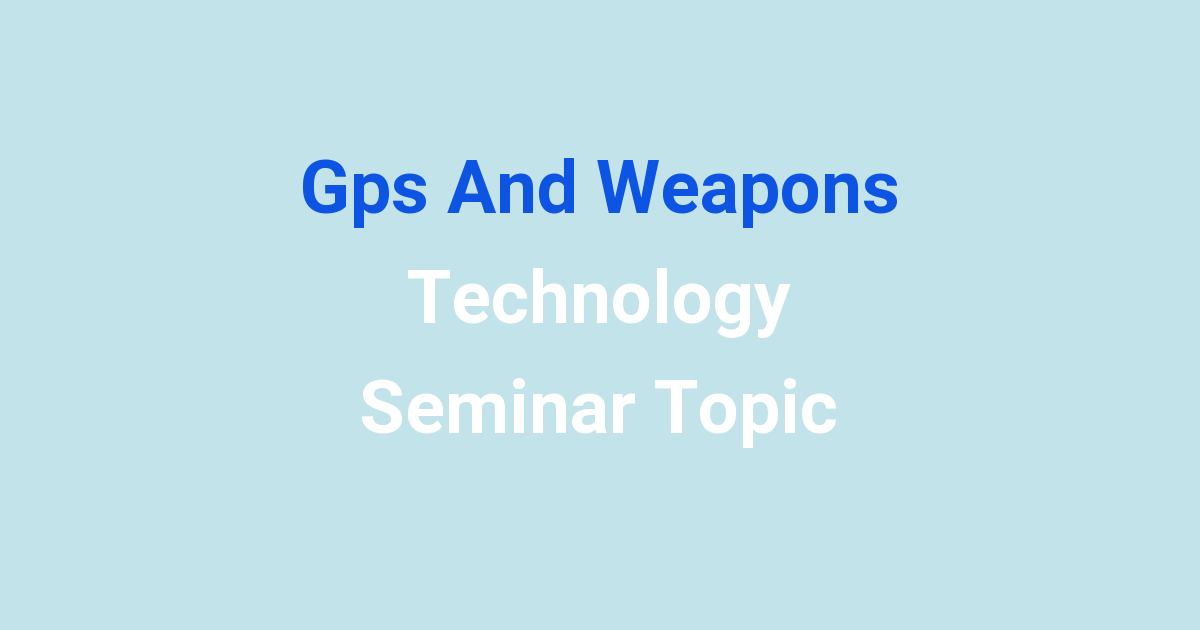Seminar on advancements in GPS technology and weapons technology.
Introduction
In today’s rapidly advancing world, technology plays a crucial role in shaping the future. One of the most fascinating technologies that have revolutionized various industries is GPS (Global Positioning System). GPS technology has become an integral part of our daily lives, from navigating through unknown roads to tracking the location of loved ones. This technology has also found applications in the defense sector, particularly in weapons systems.
Problem Statement
While GPS technology has significantly improved the accuracy and efficiency of weapons systems, there are certain limitations that need to be addressed. The existing systems have constraints in terms of accuracy, reliability, and susceptibility to jamming or spoofing attacks. These limitations can potentially compromise the effectiveness of weapons systems in critical situations.
Existing System
The existing weapons systems that incorporate GPS technology rely on signals transmitted by satellites to determine the precise location of targets. While this system has proven to be effective in most cases, there are instances where the accuracy of the system is compromised due to various factors such as atmospheric conditions or signal interference. Additionally, the existing systems are vulnerable to jamming or spoofing attacks, where hackers can manipulate the signals to mislead the weapons systems.
Disadvantages
One of the main disadvantages of the existing weapons systems is their susceptibility to jamming or spoofing attacks. These attacks can disrupt the signals transmitted by satellites, leading to inaccurate targeting or rendering the weapons systems ineffective. Another disadvantage is the limited accuracy of the existing GPS technology, which can be a crucial factor in critical military operations where precision is paramount.
Proposed System
To address the limitations of the existing weapons systems, we propose a new and improved GPS technology that is more accurate, reliable, and secure. The proposed system will incorporate advanced encryption techniques to prevent unauthorized access and manipulation of the signals. Additionally, the system will have enhanced anti-jamming capabilities to ensure uninterrupted communication between satellites and weapons systems.
Advantages
The proposed GPS technology offers several advantages over the existing systems. One of the main advantages is its improved accuracy, which will enhance the precision of targeting and reduce the risk of collateral damage. Another advantage is the system’s enhanced security features, which will prevent unauthorized access and manipulation of the signals. Additionally, the system’s anti-jamming capabilities will ensure seamless communication between satellites and weapons systems even in hostile environments.
Features
The new GPS technology will incorporate several key features to enhance its performance and reliability. One of the main features is advanced encryption techniques that will secure the signals transmitted between satellites and weapons systems. The system will also have improved anti-jamming capabilities to counteract any attempts to disrupt the communication. Additionally, the system will be designed to be more resilient to atmospheric conditions and signal interference, ensuring consistent and accurate performance.
Conclusion
In conclusion, GPS technology has become an indispensable tool in modern weapons systems, offering improved accuracy, efficiency, and reliability. However, the existing systems are not without their limitations, which can potentially compromise the effectiveness of weapons systems in critical situations. The proposed GPS technology aims to address these limitations by offering enhanced security, accuracy, and anti-jamming capabilities. By implementing this new technology, we can ensure that weapons systems operate at their full potential and fulfill their intended purpose of safeguarding national security.

